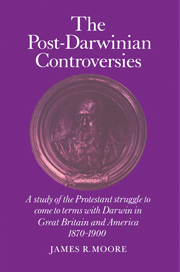 The Post-Darwinian Controversies
The Post-Darwinian Controversies Book contents
- Frontmatter
- Contents
- Dedication
- Preface
- PREFACE TO THE PAPERBACK IMPRESSION
- Introduction: the terrain of revision
- PART I HISTORIANS AND HISTORIOGRAPHY
- 1 Draper, White, and the military metaphor
- 2 Politics, polemics, and the military milieu
- 3 Warfare's toll in historical interpretation
- 4 Towards a non-violent history
- PART II DARWINISM AND EVOLUTIONARY THOUGHT
- PART III THEOLOGY AND EVOLUTION
- Conclusion: on coming to terms with Darwin
- Dedication
- Notes to the text
- Bibliography
- Index
3 - Warfare's toll in historical interpretation
Published online by Cambridge University Press: 22 January 2010
- Frontmatter
- Contents
- Dedication
- Preface
- PREFACE TO THE PAPERBACK IMPRESSION
- Introduction: the terrain of revision
- PART I HISTORIANS AND HISTORIOGRAPHY
- 1 Draper, White, and the military metaphor
- 2 Politics, polemics, and the military milieu
- 3 Warfare's toll in historical interpretation
- 4 Towards a non-violent history
- PART II DARWINISM AND EVOLUTIONARY THOUGHT
- PART III THEOLOGY AND EVOLUTION
- Conclusion: on coming to terms with Darwin
- Dedication
- Notes to the text
- Bibliography
- Index
Summary
Ideals may well be theoretically divided into good and bad, into superior and inferior, but men – and the actual battle is one of men against men – cannot be thus divided and set off against one another. … Each one of them contains within himself in varying degree the true and the false, the high and the low, spirit and matter.
Benedetto CroceMetaphors are indispensable figures of speech. By them the abstract is made concrete, the dull and dead is recreated with interest and vivacity, and the complex is cast in recollectable form. What would literature be without the elaborate metaphors of Dante's Commedia and Bunyan's Pilgrim's Progress, the enchanting allegories of George MacDonald and C. S. Lewis, and the evocative modern parables in Abbott's Flatland and Orwell's Animal Farm? Likewise metaphors, or ‘models’, are vital to the scientific enterprise. Without the model of ocean waves Huygens might not have formulated the wave theory of light; without the ‘billiard ball’ model of molecular collisions, the kinetic theory of gases would be difficult to explain; and apart from Bohr's planetary model of the atom, the development of atomic theory could have been greatly retarded.
Yet particular metaphors are always dispensable, if not in literature, whose themes are eternal, then in science and the philosophy of science, where discovery and understanding are often contingent on the model or metaphor employed. Thus Darwin acknowledged that the term ‘natural selection’, which he conceived by analogy with the ‘artificial selection’ of breeders, was less satisfactory than Herbert Spencer's phrase, ‘the survival of the fittest’, after Alfred Russel Wallace pointed out that this was ‘the plain expression of the fact’.
- Type
- Chapter
- Information
- The Post-Darwinian ControversiesA Study of the Protestant Struggle to Come to Terms with Darwin in Great Britain and America, 1870-1900, pp. 77 - 100Publisher: Cambridge University PressPrint publication year: 1979


